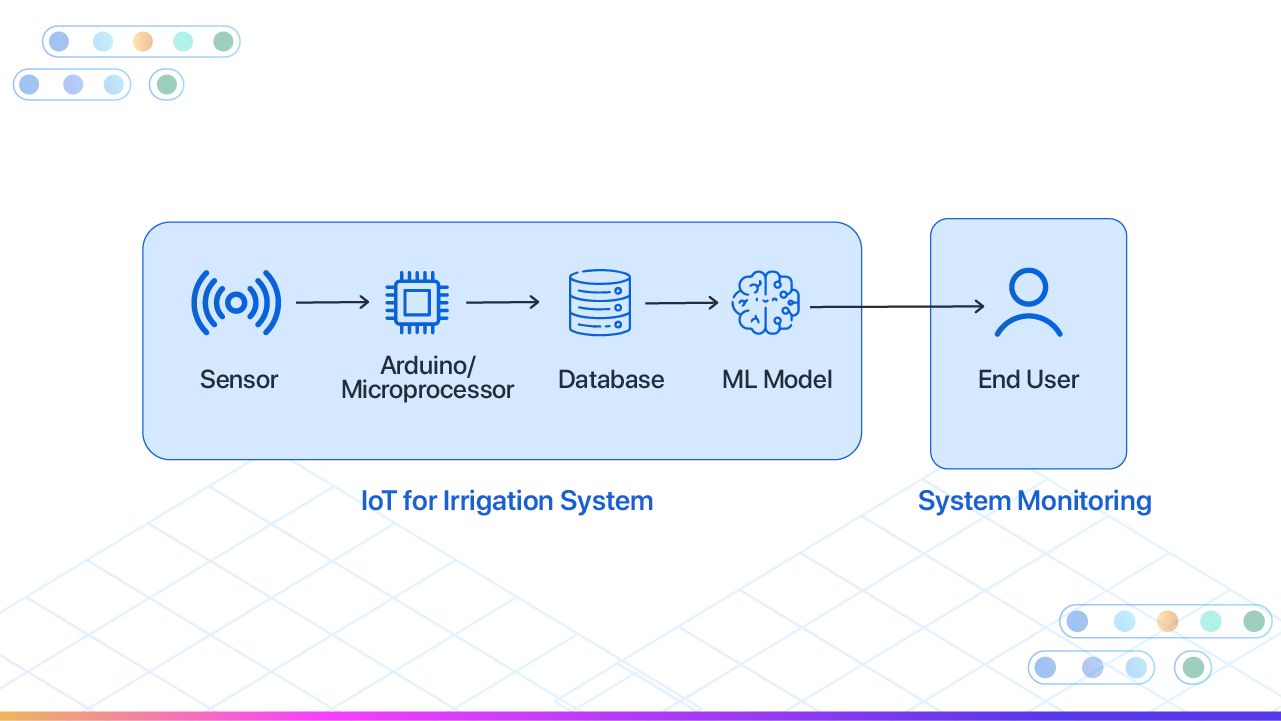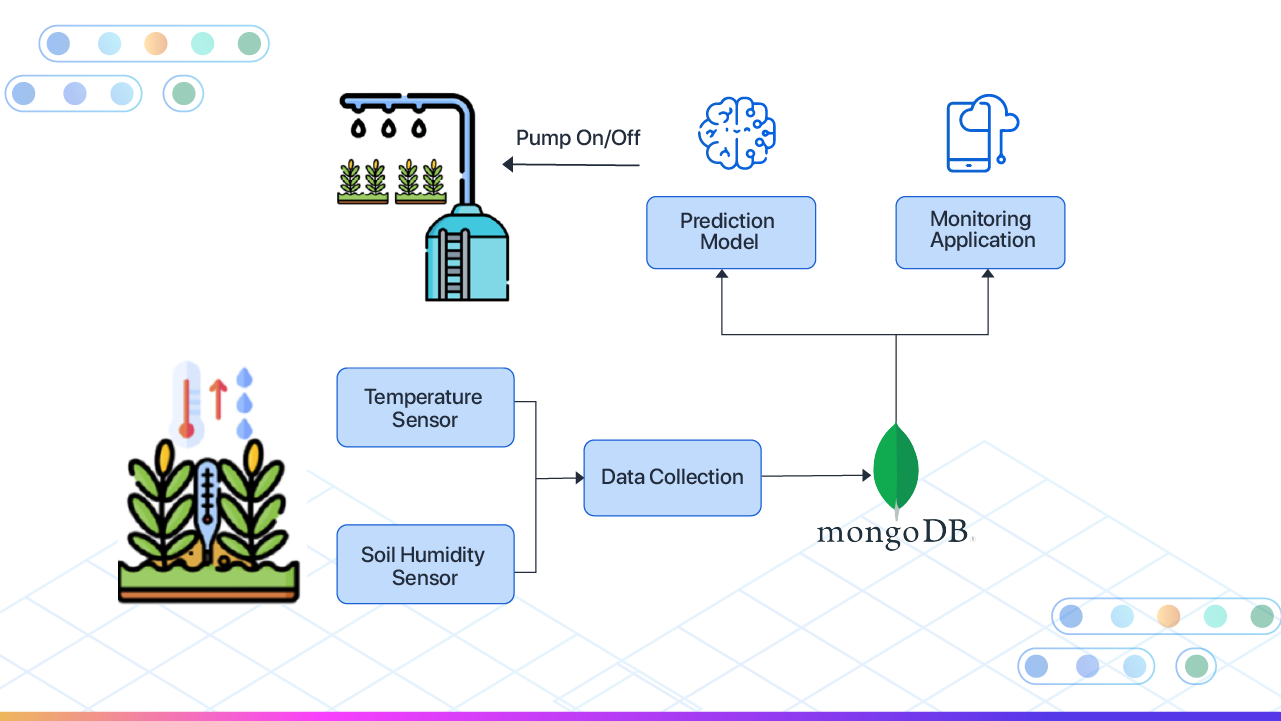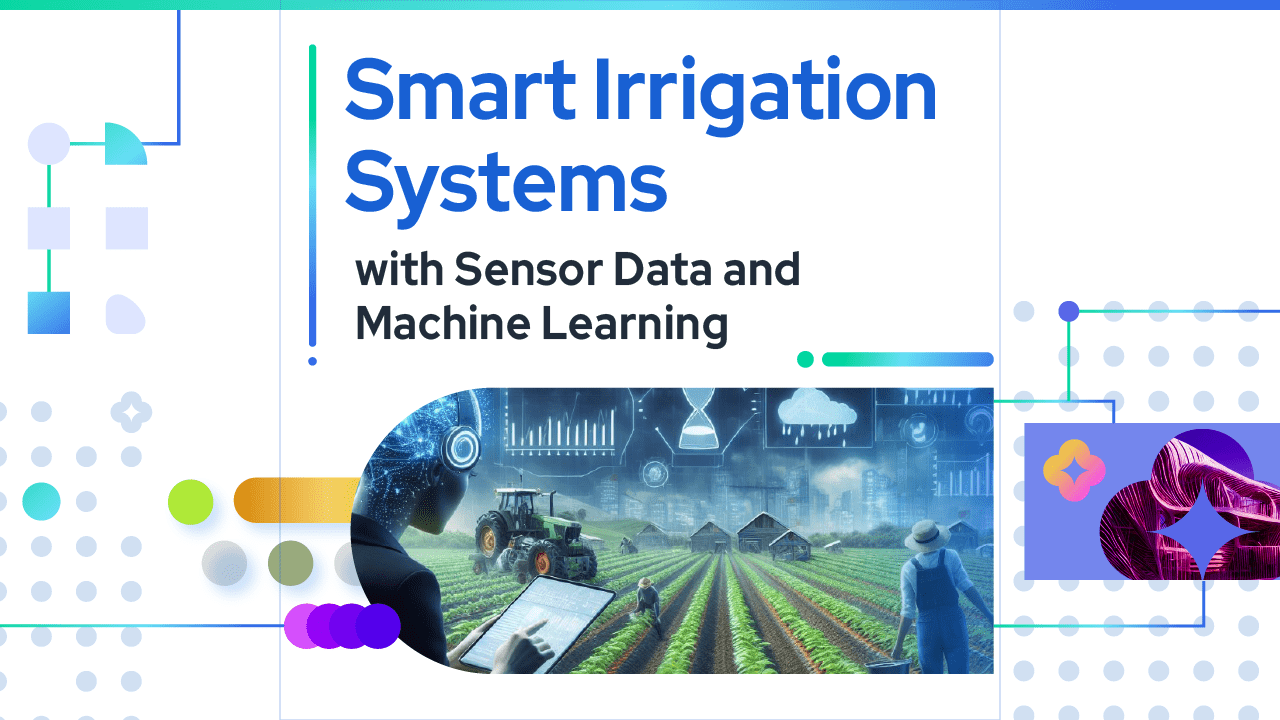Introduction
In recent years, there has been an increased focus on sustainability and environmental responsibility. As we face the impacts of climate change, it is more important than ever to find innovative solutions to conserve our natural resources. One area that has seen advancements in sustainable practices is irrigation. Traditional irrigation systems can waste water, leading to unnecessary expenses and environmental damage. Smart irrigation systems have become increasingly prominent as a solution that uses cutting-edge technology to optimize water usage. Smart irrigation systems utilize sensor data and machine learning to provide precise and efficient irrigation, reducing water usage and costs in this blog post, we will delve into the advantages of smart irrigation systems, how they work, and why they are essential for sustainable water management.
Smart Irrigation Systems
Smart irrigation systems represent a significant leap forward in sustainable water management practices. By integrating cutting-edge technology such as sensor data and machine learning algorithms, these systems offer a sophisticated approach to optimizing water usage in agricultural and landscaping applications. The traditional methods of irrigation are often inefficient and can lead to wastage of water resources. However, smart irrigation systems leverage real-time data and intelligent algorithms to deliver precise amounts of water exactly where and when it is needed, thereby promoting water conservation and reducing overall water consumption. In this blog post, we will further explore the realm of smart irrigation systems, exploring how they work and the benefits they offer for both the environment and agricultural productivity.
The Role of Sensor Data in Smart Irrigation
Sensor data serves as a fundamental component in the operation and efficacy of smart irrigation systems. These systems are crafted to optimize water usage effectively. by utilizing real-time data collected from various strategically placed sensors within the irrigation network. These sensors measure critical parameters such as soil moisture levels, weather conditions, plant health indicators, and water flow rates.
Continuous monitoring of these key metrics enables smart irrigation systems to make data-driven decisions to ensure efficient water application, tailored to meet the specific needs of plants in different areas of the landscape. For example, if a sensor detects that soil moisture levels are below the optimal range, the system can automatically trigger irrigation to provide the necessary amount of water to the plants.
Moreover, integrating sensor data with advanced technologies like machine learning enhances the intelligence of these systems over time. Machine learning algorithms can scrutinize historical data patterns to discern. trends to accurately predict future water requirements, leading to proactive irrigation scheduling and optimal resource allocation.
In essence, sensor data forms the foundation upon which smart irrigation systems operate, facilitating precise and sustainable water management practices that benefit both the environment and agricultural productivity.

Leveraging Machine Learning Algorithms
Machine learning algorithms play a vital role in the advancement of smart irrigation systems, where sustainable water management is paramount. These systems utilize a variety of machine learning algorithms to analyse sensor data and make informed decisions regarding water usage, thereby enhancing efficiency and promoting environmental sustainability.
Predicting Optimal Watering Schedules
1. Data Collection: Smart irrigation systems gather data from various sensors installed in the field, including soil moisture sensors, weather stations, and plant health monitors, covering factors such as soil moisture levels, temperature, humidity, rainfall, and plant growth metrics.
2. Data Preprocessing: Collected data undergoes preprocessing to handle missing values, outliers, and noise, utilizing techniques such as normalization, scaling, and feature engineering to prepare the data for modelling.
3. Model Selection: Supervised learning algorithms like decision trees or gradient boosting are chosen based on the prediction task. These models are trained to predict optimal watering schedules by learning patterns and relationships between input features and output labels.
4. Model Training: Historical data on watering schedules and corresponding sensor readings are used to train the machine learning model, enabling it to make precise decisions on when and how much water to deliver to crops or landscapes.
5. Model Evaluation: The performance of the trained model is assessed using metrics such as Mean Absolute Error (MAE). or accuracy, with cross-validation techniques assessing the model’s generalization performance.
6. Deployment: Once validated, the model is deployed within the smart irrigation system to generate real-time predictions for optimal watering schedules, considering factors like soil moisture thresholds and weather forecasts.
7. Continuous Learning: The model incorporates feedback loops to adapt and improve over time, updating its parameters as new data becomes available to optimize watering strategies.
Detecting Anomalies in Sensor Data:
1. Data Collection: Sensor data from various sources within the irrigation system is collected.
2. Data Preprocessing: Preprocessing techniques identify outliers, anomalies, and inconsistencies in the collected data.
3. Anomaly Detection Model Selection: Unsupervised learning algorithms such as Isolation Forest or k-means clustering are chosen to detect anomalies in the sensor data.
4. Model Training: The anomaly detection model is trained on historical sensor data representing normal operating conditions.
5. Model Evaluation: The performance of the anomaly detection model is evaluated using metrics such as precision and recall.
6. Deployment: Once validated, the anomaly detection model is deployed within the monitoring infrastructure of the smart irrigation system to raise alerts or trigger automated responses when anomalies are detected.
7. Adaptive Learning: The anomaly detection model incorporates feedback mechanisms to adapt to changing conditions and improve its detection capabilities over time.
By integrating these detailed workings of machine learning models into smart irrigation systems, stakeholders can achieve more efficient water management, reduce resource wastage, and promote sustainability in agricultural and landscaping practices. Continuous monitoring, predictive analytics, and adaptive learning mechanisms enable these systems to optimize water usage while ensuring optimal plant health and yield.

Benefits of Smart Irrigation Systems
Smart irrigation systems offer a myriad of benefits that revolutionize traditional water management practices, driven by the integration of sensor data and machine learning algorithms. These benefits include:
Water Conservation
- Efficient Water Usage: By leveraging real-time sensor data and predictive analytics, smart irrigation systems optimize water usage by irrigating only when necessary. This proactive approach reduces water waste and promotes sustainable practices, ensuring that precious water resources are utilized efficiently.
- Environmental Stewardship: Water conservation not only cuts costs but also promotes environmental sustainability by easing pressure on water sources and reducing ecological impact.
Enhanced Plant Health and Growth
- Targeted Watering: Smart irrigation systems monitor soil moisture levels, weather conditions, and plant requirements to deliver the right amount of water at the right time. This targeted approach prevents issues such as overwatering or underwatering, leading to healthier plants, improved yields, and better overall landscape aesthetics.
- Optimized Nutrient Uptake: By providing plants with optimal hydration levels, these systems facilitate better nutrient uptake, promoting stronger root development and overall plant health.
Cost Savings
- Reduced Water Bills: Automated irrigation schedules and adaptive water usage, driven by environmental factors, reduce water bills and operational expenses linked to irrigation.
- Preventative Maintenance: The predictive capabilities of smart irrigation systems can prevent costly damages caused by overwatering or drought stress, ultimately saving money in the long run by reducing the need for repairs and replacements.
Convenience and Flexibility
- Remote Monitoring and Control: With remote monitoring and control capabilities, users can easily adjust settings, schedule watering times, and receive alerts on their smartphones or computers. This level of automation simplifies the irrigation process, offer users convenience and flexibility in managing their tasks.
- Time Savings: By automating irrigation tasks and providing real-time insights, smart systems free up time for users to focus on other tasks, improving overall efficiency and productivity.
In essence, the benefits of smart irrigation systems extend beyond water conservation to encompass improved plant health, cost savings, convenience, and sustainability. By harnessing sensor data and machine learning technology, these systems are transforming the way we manage water resources and promoting a more efficient and environmentally conscious approach to irrigation practices.
Case Studies: Successful Implementations of Smart Irrigation
1. Green Thumb Farms: Green Thumb Farms, a large-scale agricultural operation in the Midwest, implemented a smart irrigation system across its vast fields of crops. By harnessing sensor data and machine learning algorithms, the farm was able to optimize water usage based on real-time weather conditions and soil moisture levels. This resulted in a significant reduction in water consumption while maintaining healthy crop yields, leading to cost savings and environmental benefits.
2. City Parks Department: The City Parks Department of a major metropolitan area adopted a smart irrigation system for its public parks and green spaces. By integrating sensor data with advanced scheduling algorithms, the department was able to tailor watering schedules to specific areas based on factors like sunlight exposure and soil type. This precision irrigation approach not only conserved water but also improved the overall health and aesthetics of the parks, enhancing the visitor experience.
3. Golf Course Resort: A luxury golf course resort invested in a smart irrigation system to maintain its sprawling grounds in top condition while minimizing water waste. By utilizing sensor data to monitor moisture levels and weather forecasts, the resort’s groundskeeping team could adjust irrigation patterns in real time. This proactive approach not only saved on water costs but also contributed to a more sustainable and environmentally friendly operation, aligning with the resort’s commitment to conservation.
These case studies illustrate the varied applications and advantages of smart irrigation systems in various settings, showcasing how the integration of sensor data and machine learning technologies can revolutionize water management practices for improved sustainability and efficiency.
Challenges and Limitations of Smart Irrigation System
While smart irrigation systems offer numerous benefits for sustainable water management, they also come with their own set of challenges and limitations. One of the primary challenges is the initial cost of implementing these systems. The technology involved in smart irrigation, such as sensors, controllers, and data analytics software, can be expensive to install and maintain.
Another limitation is the need for a reliable internet connection for these systems to function effectively. In areas with poor connectivity, smart irrigation systems may not operate optimally, leading to inefficiencies in water usage.
Additionally, the complexity of smart irrigation technology can be a barrier for some users. Farmers or landscapers who are not familiar with digital tools and data analytics may find it challenging to set up and troubleshoot these systems.
Moreover, the reliance on technology means that smart irrigation systems are vulnerable to potential technical issues or malfunctions. Regular maintenance and updates are imperative to uphold system functionality of the systems.
Despite these challenges and limitations, advancements in sensor data and machine learning continue to enhance smart irrigation technology, making it a valuable tool for sustainable water management in agriculture and landscaping. By addressing these challenges and finding solutions, the potential benefits of smart irrigation systems can be fully realized.
Enhancing Water Efficiency through Smart Irrigation
Smart irrigation systems are at the forefront of revolutionizing water management, offering a sustainable solution for efficient water usage in agriculture and landscaping. By seamlessly integrating sensor data and implementing sophisticated machine learning algorithms, these systems have the potential to significantly enhance water efficiency and conservation efforts.
One of the hallmark features of smart irrigation systems lies in their ability to adapt and respond to real-time environmental conditions. By harnessing data from sensors monitoring factors such as soil moisture levels, weather forecasts, and plant water requirements, these systems can make precise adjustments to irrigation schedules and watering amounts. This targeted approach not only ensures that plants receive the optimal amount of water they need but also mitigates issues such as overwatering — a common pitfall in traditional irrigation methods.
Moreover, by incorporating machine learning algorithms, smart irrigation systems can delve into historical data and patterns to predict future water needs with remarkable accuracy. This predictive capability enables proactive adjustments to irrigation schedules, accounting for seasonal variations and long-term trends. As a result, water usage is optimized, minimizing waste and fostering sustainable water management practices.
In essence, smart irrigation systems stand as beacons of progress in enhancing water efficiency in agriculture and landscaping. By leveraging sensor data and machine learning technologies, these systems offer a smarter, more sustainable approach to irrigation, ultimately contributing to the conservation of precious water resources for future generations.
Future Trends in Smart Irrigation Systems
As technology continues to evolve, the future of smart irrigation systems appears promising, with innovative trends reshaping the landscape of sustainable water management.
A key trend gaining traction is the seamless integration of sensor data and machine learning algorithms to optimize irrigation practices. Sensor technology is crucial in providing up-to-the-minute data on soil moisture, weather patterns, and plant water needs. Analyzing this data with machine learning algorithms helps create predictive models that accurately predict when and how much water should be used for crops.
Another emerging trend is the utilization of IoT (Internet of Things) devices to remotely monitor and control irrigation systems. This empowers farmers to adjust irrigation schedules and settings from anywhere, using smartphones or computers. IoT-enabled smart irrigation systems not only enhance efficiency but also curtail water wastage by ensuring water is applied precisely when and where needed.
Furthermore, the adoption of cloud-based platforms for data storage and analysis is revolutionizing smart irrigation systems. Cloud computing offers scalability, flexibility, and accessibility, enabling farmers to store and analyze vast amounts of data efficiently. This empowers them to make data-driven decisions and optimize water usage for improved crop yield and sustainability.
In conclusion, the future of smart irrigation systems shines brightly, with advancements in sensor technology, machine learning, IoT devices, and cloud computing driving innovation in sustainable water management practices. By harnessing these technologies, farmers can achieve higher productivity, resource efficiency, and environmental sustainability in their agricultural operations.
Environmental Impact and Sustainability of Smart Irrigation
Smart irrigation systems are revolutionizing water resource management by offering a sustainable answer to the urgent issues of water scarcity and environmental degradation. By harnessing sensor data and leveraging machine learning algorithms, these systems optimize water usage, reduce waste, and minimize environmental impact.
A key advantage of smart irrigation systems lies in their ability to adapt to real-time environmental conditions. Monitoring factors like soil moisture levels and weather conditions facilitates precise water delivery, ensuring plants receive optimal amounts. This not only ensures plants receive the right amount of water at the right time but also minimizes water runoff and evaporation, conserving valuable water resources.
Furthermore, by incorporating machine learning algorithms, smart irrigation systems continuously learn and improve their efficiency over time. These algorithms analyze data patterns and trends to optimize irrigation schedules, detect leaks or malfunctions, and predict future water needs. By constantly refining their operations, smart irrigation systems achieve maximum water efficiency and sustainability.
In conclusion, the environmental impact and sustainability benefits of smart irrigation systems are evident. By combining sensor data and machine learning technology, these systems offer a proactive and intelligent approach to water management, promoting conservation, efficiency, and environmental stewardship. Embracing smart irrigation technologies will be crucial in ensuring a sustainable future for generations to come as we confront water challenges in a changing climate.
Conclusion
In conclusion, the future of sustainable water management is intricately tied to the innovative integration of smart irrigation systems, sensor data, and machine learning techniques. These advanced technologies present a promising solution to the challenges faced by traditional irrigation methods, such as water wastage, inefficiency, and environmental impact.
By harnessing the power of sensor data, smart irrigation systems accurately monitor soil moisture levels, weather conditions, and plant needs in real-time. This precision-driven strategy enables optimal water delivery, guaranteeing plants receive the perfect amount of water necessary for healthier crops and decreased water consumption.
Moreover, machine learning algorithms further enhance the efficiency of smart irrigation systems by analysing historical data, predicting future water requirements, and adjusting irrigation schedules accordingly. This proactive approach not only saves water but also reduces energy consumption and operational costs.
In essence, smart irrigation systems represent a cutting-edge technology that holds great potential in revolutionizing the way we manage water resources. By embracing these sustainable solutions, we can create a more environmentally friendly and water-efficient future for agriculture, landscaping, and beyond. Let’s utilize the power of technology to build a more sustainable world for generations to come.



